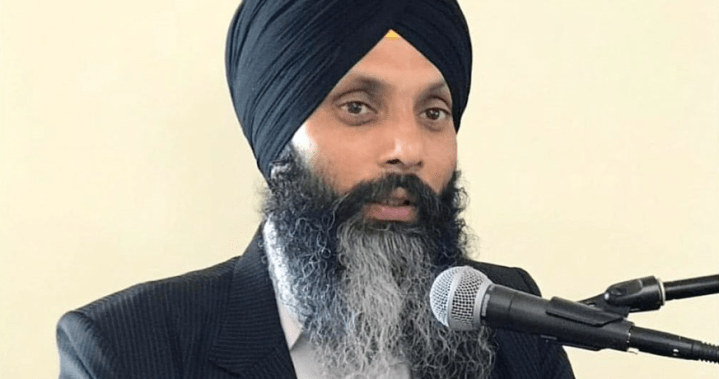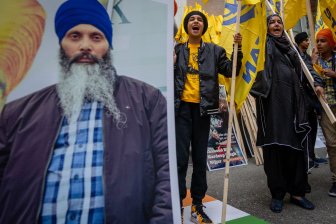Canadian national security authorities have obtained “credible” intelligence suggesting “agents of the government of India” were behind the June murder of Hardeep Singh Nijjar, a prominent Sikh leader in B.C., Prime Minister Justin Trudeau says.
Trudeau disclosed the intelligence to the House of Commons Monday. He said he also raised it with Indian Prime Minister Narendra Modi at the G20 summit in New Delhi earlier this month, and Canadian officials have been in contact with India’s government and intelligence agencies.
The new intelligence is contrary to statements from police in British Columbia who have said they had no evidence that the killing was linked to foreign interference.

“Over the past number of weeks, Canadian security agencies have been actively pursuing credible allegations of a potential link between agents of the government of India and the killing of a Canadian citizen, Hardeep Singh Nijjar,” he said.
“Any involvement of a foreign government in the killing of a Canadian citizen on Canadian soil is an unacceptable violation of our sovereignty. It is contrary to the fundamental rules by which free, open and democratic societies.”
India’s Foreign Ministry released a statement early Tuesday and rejected Trudeau’s assertion of a potential link between the Indian government and the killing of Nijjar.
“Allegations of Government of India’s involvement in any act of violence in Canada are absurd and motivated,” the statement read.
“We reject any attempts to connect Government of India to such developments.”
Forty-five-year-old Nijjar, president of the Guru Nanak Sikh Gurdwara, was shot dead in the parking lot of the temple in Surrey after evening prayers on June 18.
His death sent shockwaves through Metro Vancouver and Canada’s Sikh community, with thousands attending his funeral later that week. Community members vowed Monday to protest Indian consulate offices across the country in reaction to Trudeau’s disclosure.

Nijjar was not only a community leader and advocate, but a Khalistani, supporting the creation of a separate state for Sikhs. The Khalistan movements rose to prominence in the 1980s, however discussion around sovereignty for Sikhs and Punjab can be traced back to the 1947 partition of India.
The Khalistan movement is outlawed in India, as are a number of groups associated with the movement, which are listed as “terrorist organisations” by the Indian state.
Foreign Affairs Minister Melanie Joly told reporters outside the House of Commons that Canada has expelled a top Indian diplomat “as a consequence” of the intelligence.

Joly’s office later confirmed the expelled official is Pavan Kumar Rai, who Joly said led the Canadian branch of the Research and Analysis Wing (RAW), India’s foreign intelligence service.
“The allegations that a representative of a foreign government may have been involved in the killing of a Canadian here in Canada, on Canadian soil, is not only troubling but it is completely unacceptable,” she said.
“If proven true this would be a great violation of our sovereignty and of the most basic rule of how countries deal with each other.”
The RAW, along with the Indian Intelligence Bureau, was allegedly behind a covert operation dating back to 2009 to influence Canadian politicians using money and disinformation, according to documents obtained by Global News.
In a public statement, Sikhs for Justice urged Trudeau to also expel Indian High Commissioner to Canada Sanjay Verma immediately in light of Monday’s revelations. The group describes itself as a human rights advocacy group that supports Khalistan.
The Indian consulate in Ottawa did not immediately respond to requests for comment.

Trudeau informed the leaders of the opposition parties of the development shortly before rising in the House.
NDP Leader Jagmeet Singh, a practicing Sikh of Punjabi descent, said the intelligence was “outrageous” and “shocking” in light of years of unconfirmed allegations of foreign interference in Canada by the Indian government.
He spoke forcefully in English and Punjabi to the Canadian-Indian diaspora, urging them to not fall into despair.
“We all knew as children that the Indian government commits many atrocities,” he said in Punjabi. “But we never thought we’d have to face this danger after coming here to Canada.
“I want to say to everyone that I am here. With whatever strength I have, I will not budge until justice is served in this case.”

The NDP is currently supporting the minority Liberal government through a confidence and supply agreement.
B.C. Premier David Eby said in a statement he was briefed on the intelligence by the Canadian Security Intelligence Service.
“I am deeply disturbed and angered by this information,” he said. “Canadians across the country must be safe from the interference of foreign governments, including being targeted for threats or physical harm, including murder.
“Our democracy depends on it.”
The new intelligence comes as Canada has cut off trade talks with India and postponed a planned trade mission to the country that was set for October.
For weeks, Canadian officials refused to explain the reasoning behind the sudden end to the talks, which were aimed at establishing deeper trade ties under Canada’s Indo-Pacific strategy.
Following Trudeau’s meeting with Modi on the sidelines of the G20, Modi’s office said in a statement that the Indian prime minister had raised “strong concerns” about Sikh separatists in Canada, calling them “extremists.”
Trudeau had told reporters before departing for the G20 summit that he wanted to raise the issue of foreign interference and “the importance of the rule of law” with Modi. He said the recently-announced public inquiry into foreign interference — which began Monday — would look beyond China and Russia at other countries, but did not mention India.

On Monday, the World Sikh Organization of Canada called on Ottawa to definitively add India to that list.
“The significance of today’s announcement cannot be understated for Sikhs,” said president Tejinder Singh Sidhu.
“Today’s announcement must be followed by concrete action. India cannot be allowed to disregard the rule of law and the sovereignty of foreign states.”
Public Safety Minister Dominic LeBlanc told reporters in Ottawa he expects Quebec Court of Appeal Justice Marie-Josee Hogue, who is leading the foreign interference inquiry, to follow the evidence wherever it may lead — suggesting the newly disclosed intelligence will be included.
“We assume that she and the security agencies will do what’s necessary for her inquiry to also look at the ways that India interferes in Canada,” LeBlanc said.
The day after Nijjar’s death, the World Sikh Organization of Canada accused Canadian police and intelligence agencies of failing to protect him, given the “known” threats to his life. The organization called on Canadian intelligence and law enforcement to fully investigate Nijjar’s killing, including foreign interference, “specifically from India.”
In its Monday news release, it described the intelligence revelations as confirming “what Canadian Sikhs have known for months.”
The group further called on Ottawa and Canada’s intelligence agencies to bring perpetrators of the killing to swift justice, and to protect other Sikhs in Canada who face threats from India and its agents.
It urged Canada to cease intelligence-sharing with India as well.

Joly said she would raise the issue with her peers in the G7 on Monday evening in New York City ahead of the United Nations General Assembly. She said Trudeau also raised the allegations with U.S. President Joe Biden in New Delhi last month.
She added that Canada is working to make sure Canadian diplomats in India are safe.
Warnings of targeted threats
Multiple sources have told Global News that Nijjar was repeatedly threatened prior to his killing, reportedly in relation to his political activism.
In a May 18 interview with Burnaby’s Spice Radio 1200 AM, Nijjar had voiced concerns about being on a hit list.
“The people who are raising their voices about human rights can be murdered, and India has the ability to do it,” Nijjar had said in Punjabi.
After Nijjar’s murder, a spokesperson for the BC Gurdwaras Council who knew Nijjar told Global News he went into hiding, not wanting to be anywhere near his family with tensions so high. Moninder Singh, 42, said he, Nijjar and three others had been warned in July 2022 about an “imminent threat of assassination” against them, but the source of the threat was never revealed by RCMP.
The common denominator between all the men threatened, however, was their “activism for Sikh sovereignty, self-determination and constantly showing India’s human rights as being extremely poor,” Singh claimed.

RCMP have declined to confirm or deny any threats made against Singh or Nijjar.
As of Monday afternoon, no arrests had been made in connection with Nijjar’s murder.
Police, however, are searching for three suspects, two of whom are believed to have fled the scene on foot toward a getaway vehicle. A suspect vehicle, a silver 2008 Toyota Camry, has also been identified.
According to an Indian media report in 2016, Nijjar was accused of running a terror training camp in Mission, B.C., allegedly training Sikh youth to potentially carry out attacks in the state of Punjab.
RCMP have previously said there is no information to substantiate any claims of a camp in Mission.
Nijjar had repeatedly stated his innocence and penned a letter to Trudeau calling the allegations “factually baseless and fabricated.”

In 2018, India filed a First Information Report against Nijjar, whom it accuses of plotting to carry out a major terrorist attack in Punjab.
Nijjar had previously admitted to speaking out in favour of Sikh separatism but denied being involved in any acts of violence.
Trudeau told the House of Commons Monday that his government is working to ensure law enforcement pursues those responsible.
Conservative Leader Pierre Poilievre told the House that if the allegations are proven true, they represent an “outrageous affront” to Canadian sovereignty. He said India needs to “act with utmost transparency” in the investigation.
“Because the truth must come out. We must know who performed the assassination, and who was behind the assassination,” he said.
– with files from Darrian Matassa-Fung




